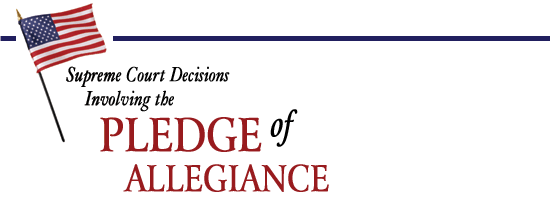Pledge of Allegiance
September/October 2003

Minersville School District v. Gobitis
In 1940, 14 years before Congress added the phrase "under God" to the Pledge. A school district in Pennsylvania said that students had to recite the Pledge. The Supreme Court said it was OK for the school district to expel students who didn't.
A brother and sister—Jehovah's Witnesses—were expelled from school when they refused to recite the Pledge because of their religious beliefs. Their father filed suit, asking that his children be allowed to attend public school without having to recite the Pledge, without having to offend their beliefs. The Court found that the Pledge fostered national unity, that unity was the basis for national security, and that national security was far more important than a religious belief. Children in public schools could be required to recite the Pledge.
West Virginia State Board of Education v. Barnett
The Minersville ruling had an unintended consequence: a striking increase in the public persecution of Jehovah's Witnesses. Because of their refusal to recite the Pledge, they were considered unpatriotic. Many were beaten; others were stoned by mobs of "patriots."
Just three years after the Minersville decision, the Court reconsidered the matter. West Virginia had passed a law that made it an act of insubordination for public school students to refuse to recite the Pledge. Parents could be sent to jail if their children refused, and the children could be sent to reformatories. Once again the law and the religious beliefs of Jehovah's Witnesses were in conflict. The Court ruled that to require students to recite the Pledge was to invade "the sphere of intellect and spirit which it is the purpose of the First Amendment to our Constitution to reserve from all official control." Minersville was history. Students could no longer be required to recite the Pledge.
Engel v. Vitale
In 1962 the Court heard this case about a prayer to be recited at the beginning of each school day in the public schools in New York. The prayer—written by the State Board of Regents—was to be recited right after the Pledge. Even though students were no more required to recite the prayer than the Pledge, the Court found that "when the power, prestige and financial support of government is placed behind a particular religious belief, the indirect coercive pressure upon religious minorities to conform to the prevailing officially approved religion is plain." The prayer requirement was found unconstitutional. The Court found that "the Pledge of Allegiance, like the [New York] prayer, recognizes the existence of a Supreme Being."
Abington v. Schempp
The Pledge came up in this 1963 case about a Pennsylvania law that required that "at least ten verses from the Holy Bible shall be read, without comment, at the opening of each public school on each school day." In the Abington school district the reading of the Bible verses was followed by a recitation of the Lord's Prayer and then the Pledge of Allegiance.
Edward Schempp was raising his children in the Jewish faith. The children attended school in the Abington district, and Schempp brought the suit to end the Bible readings and prayer. The Court ruled in Schempp's favor. In its decision the Court mentioned the Pledge in a section headed "Activities Which, Though Religious in Origin, Have Ceased to Have Religious Meaning."
Marsh v. Chambers
In 1983 the Court concluded that a state could pay a chaplain to say a prayer at the start of each session of the legislature. It found that legislative prayers were constitutional, since they were a 200-year-old tradition and since "under God" had been in the Pledge so long—almost 30 years—that it had "lost any true religious significance."
Lynch v. Donnelley
This case, decided in 1984, was the first to use the term ceremonial deism. The Pledge was considered, and the following was noted: "While I remain uncertain about these questions, I would suggest that such practices as the designation of 'In God We Trust' as our national motto, or the references to God contained in the Pledge of Allegiance to the flag can best be understood . . . as a form a 'ceremonial deism,' protected from establishment clause scrutiny chiefly because they have lost through rote repetition any significant religious content."
Wallace v. Jaffree
In 1982 an Alabama law authorized public school teachers to lead "willing students" in a prayer to "Almighty God
. . . the Creator and Supreme Judge of the world." Then in 1984 a district court found that "Alabama has the power to establish a state religion if it chooses to do so." Guess what? That finding was appealed to the Supreme Court. In his dissenting opinion Chief Justice Warren Burger posed a question about the act of Congress that added "under God" to the Pledge: "Do the several opinions in support of the judgment today render the Pledge unconstitutional?"
Allegheny v. ACLU
In 1989 the Court heard this case about Nativity scenes on public property. In its ruling the Court noted that unless it allowed exceptions to the establishment clause in accord with the notion of ceremonial deism, "such practices as our national motto ('In God We Trust') and our Pledge of Allegiance (with the phrase 'under God,' added in 1954, . . . ) are in danger of invalidity."
Lee v. Weisman
And in 1992 the Court determined that having clergy offer prayers at public school graduation ceremonies was forbidden by the establishment clause. In his dissenting opinion Justice Antonin Scalia posed this question: "Must the Pledge therefore be barred from the public schools (both from graduation ceremonies and from the classroom)?"
